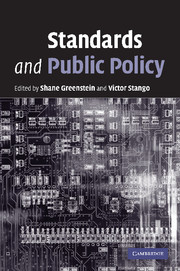Book contents
- Frontmatter
- Contents
- List of figures
- List of tables
- List of contributors
- Introduction
- 1 Standard setting in markets: the browser war
- 2 Competition through institutional form: the case of cluster tool standards
- 3 The economic realities of open standards: black, white, and many shades of gray
- 4 Coordination costs and standard setting: lessons from 56K modems
- 5 Promoting e-business through vertical IS standards: lessons from the US home mortgage industry
- 6 Intellectual property and standardization committee participation in the US modem industry
- 7 Manipulating interface standards as an anticompetitive strategy
- 8 Delay and de jure standardization: exploring the slowdown in Internet standards development
- 9 Standardization: a failing paradigm
- 10 Standards battles and public policy
- 11 Switching to digital television: business and public policy issues
- 12 Should competition policy favor compatibility?
- Index
- References
10 - Standards battles and public policy
Published online by Cambridge University Press: 22 September 2009
- Frontmatter
- Contents
- List of figures
- List of tables
- List of contributors
- Introduction
- 1 Standard setting in markets: the browser war
- 2 Competition through institutional form: the case of cluster tool standards
- 3 The economic realities of open standards: black, white, and many shades of gray
- 4 Coordination costs and standard setting: lessons from 56K modems
- 5 Promoting e-business through vertical IS standards: lessons from the US home mortgage industry
- 6 Intellectual property and standardization committee participation in the US modem industry
- 7 Manipulating interface standards as an anticompetitive strategy
- 8 Delay and de jure standardization: exploring the slowdown in Internet standards development
- 9 Standardization: a failing paradigm
- 10 Standards battles and public policy
- 11 Switching to digital television: business and public policy issues
- 12 Should competition policy favor compatibility?
- Index
- References
Summary
Abstract
We examine the effectiveness of public policy in a context of competing standards with network externalities. We show that, if the policymaker is very impatient, then it is optimal to support the leading standard; whereas, if the policymaker is very patient, then it is optimal to support the lagging standard. We also consider the timing for optimal intervention and provide sufficient conditions under which it is optimal to delay or not to delay intervention.
Keywords: standards, network externalities, public policy.
JEL Code Nos.: L13, L51, O33
Introduction
VHS vs. Betamax VCRs; Apple MacIntosh vs. PC DOS microcomputers; discrete vs. matrix quadraphonic systems. These are three of a long list of examples from recent history where two (or more) alternative versions of a new standard battled for market dominance. One aspect common to most of these standards is the importance of network effects: the fact that many users buy a DOS-based microcomputer increases the utility of buying a DOS-based microcomputer (among other reasons because the amount of software, technical support, etc., available for DOS users will be better and more widely available).
Given the importance of network industries, it is surprising that little attention has been paid to the role of public policy in standards battles. Consider the cases of high-definition television (HDTV) and mobile telecommunications.
- Type
- Chapter
- Information
- Standards and Public Policy , pp. 329 - 344Publisher: Cambridge University PressPrint publication year: 2006
References
- 7
- Cited by

